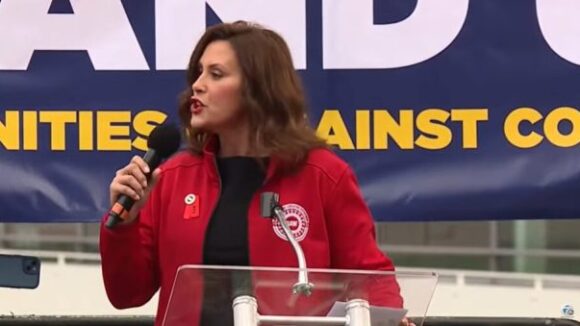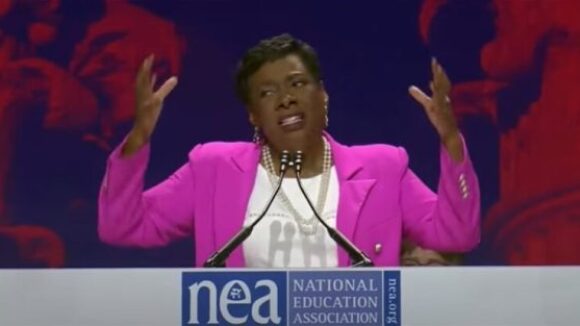Tyranny Triumphs in the Great Lakes State
Ignoring ample evidence of forced unionism’s unfairness and its damaging impact on jobs and incomes, Big Labor Michigan Gov. Gretchen Whitmer signed Right to Work destruction in 2023.
[Chattanooga Volkswagen (VW) employees rejected the United Auto Workers Union (UAW) in a secret-ballot union authorization election. Yet, UAW Union Bosses are interfering with the certification of the secret-ballot election by the National Labor Relations Board (NLRB). It is time for the UAW ‘s Bob King and company to accept defeat and allow the Chattanooga VW employees focus on making cars rather than an attempted hostile takeover of the shop floor by the UAW.]
Union Bosses Handed an Election ‘on a Silver Platter,’ Still Lose
(Click to download the March 2014 Newsletter)
On February 3, front-line employees at the Volkswagen (VW) plant located in Chattanooga, Tenn., learned that, starting in just nine days, a vote would be held to determine whether or not officers of a single union, the United Auto Workers (UAW AFL-CIO), would acquire monopoly-bargaining power at the facility.
Ever since the Chattanooga assembly plant opened in 2011, any employee has been free to share his or her views on compensation and work-rule issues, and supervisors and managers have been free to listen and, whenever they think it makes sense, act on what they hear.
Supporters and opponents of the UAW union, as well as fence-sitters, have all been equally free to communicate with VW management.
If UAW kingpins had prevailed in last month’s election, this would no longer have been the case.
Federal Labor Law Guts Employees’ Freedom to Speak With Managers
Had the UAW amassed a majority of the ballots cast, and had no successful challenge to the vote ensued, the National Labor Relations Board (NLRB) would have certified the UAW as production employees’ “exclusive” bargaining agent.
Once that happened, any manager who willingly listened to one or more employees explain why they disagreed with a position or positions espoused by the UAW would have been culpable of an “unfair labor practice” that might result in fines or other penalties being levied against the company by the NLRB.
Employees who disagreed with the UAW brass would also effectively have been prohibited from having any other representative to communicate their views, rather than the union’s, directly to the employer.
Incredibly, throughout the vast majority of their Chattanooga organizing campaign UAW kingpins were actively opposed to VW employees’ having even the opportunity to vote in a secret-ballot election before their freedom of speech was sharply curtailed under a union monopoly-bargaining scheme.
Again and again, UAW czar Bob King and his lieutenants publicly pressured VW executives to grant union officials monopoly-bargaining privileges based on signed union “authorization” cards alone, without a secret-ballot vote.
 Workers, Aided by Right to Work Attorneys, Ultimately Secured a Secret-Ballot Vote
Workers, Aided by Right to Work Attorneys, Ultimately Secured a Secret-Ballot Vote
National Right to Work Committee President Mark Mix observed, “If VW had caved in to UAW bosses’ pressure for a so-called ‘card check,’ a union monopoly would very likely already be installed in the Chattanooga plant by now.
“Employees who had signed cards while union organizers were staring at them would have consigned not just themselves, but all of their fellow front-line employees, to UAW control.
“However, thanks to the intense opposition to the Big Labor ‘card check’ scheme mounted by independent-minded VW employees in Chattanooga, eventually VW executives decided their only practical choice was to disappoint union kingpins and allow a secret-ballot vote.”
With free assistance from attorneys on the staff of the Committee’s sister organization, the National Right to Work Legal Defense Foundation, employees opposed to a union monopoly collected more than 600 signatures for a petition stating they did not want to have the UAW foisted on them.
Also with Right to Work legal assistance, employees gathered ample evidence that UAW organizers had illegally used misrepresentations, coercion, threats, and inducements to obtain many of the authorization card signatures that were being deployed to enthrone UAW bosses without a secret-ballot vote
Company Executives Were Willing to Break the Law To Ensure a UAW Victory
Even after VW leaders finally decided they could not hand over all their front-line employees to the UAW brass based on such highly dubious evidence of majority support, they tilted the electoral playing field steeply in Big Labor’s favor.
As a Washington Times editorial on February 7 pointed out, over the course of the nine days between when the election was announced and its onset, VW “allowed union activists to canvass inside the plant, while forbidding employees opposed to unionization an equal chance to argue the other side.”
Corporate leaders also made it plain that they wanted to have UAW bosses as their “partners” in a “works council.” In its native Germany, VW has long had such a works council “partnership” with officers of the German union IG Metall.
It is well-established under federal labor law that is illegal for a company to grant union advocates access to its work areas to make their case to employees, while denying equal access to unionization opponents. Company executives were evidently willing to take the risk of having NLRB charges filed against them in order to ensure a UAW victory.
But on Valentine’s Day evening, America learned that the workers had still said “no.”
VW Chattanooga employees voted against unionizing by a margin of 712 to 626. Union bosses’ margin of defeat would undoubtedly have been far greater had opponents had equal ability to campaign on company property.
Daily Caller pundit Mickey Kaus acerbically commented the following day: “The UAW couldn’t even win an election it had been handed on a silver platter by management.”
 ‘Many of Us Have Belonged To Unions or Have Seen the Damage That Unions Can Do’
‘Many of Us Have Belonged To Unions or Have Seen the Damage That Unions Can Do’
Contrary to propagandistic contentions made by a number of union spokesmen and likeminded members of the media after the results were in, employees knew full well what it was that they were rejecting when they voted against UAW monopoly bargaining.
Fortunately, one of the VW employees who helped lead the campaign for the plant to remain union-free was given the opportunity to set the record straight in the New York Times a few days after the ballots were counted.
Mike Jarvis, a three-year employee who works on the finishing line, explained to Times readers that bad experiences with Big Labor in forced-unionism states are a reason why a number of people he has personally met now live in his part of Right to Work Tennessee:
“I’d be in a local restaurant when we were fighting the U.A.W. and some stranger would come up to me and say ‘I relocated here because it’s nonunion.’ I’d be in church and someone would tell me: ‘Good luck. I’m from up North, and I lost my job because of unions. They’re a bad deal. . . .’
“Many of us have belonged to unions or seen the damage that unions can do. Many of us have chosen to live in an antiunion area.”
Personal Freedom ‘Shouldn’t Hinge on the Result of A Unionization Election’
Mr. Mix expressed his happiness that, in this case, the secret-ballot election has made it possible, at least for now, for employees to retain their freedom as individuals to speak with their managers on workplace issues, regardless of whether they agree or disagree with positions espoused by UAW bosses.
At the same time, he shared his concern that, in America today, it is still readily possible in forced-unionism and Right to Work states alike for your freedom to speak with your manager on your own behalf to be largely extinguished by a successful union organizing campaign.
“The employee’s freedom to speak with his or her manager, as an individual, regarding workplace issues shouldn’t hinge on the result of a unionization election,” said Mr. Mix
“Unfortunately, even in the Chattanooga VW plant, where UAW kingpins were just defeated, this basic freedom remains in jeopardy today as UAW lawyers pursue a novel legal theory to get last month’s election overturned by the NLRB.
“The fact is, the simple ability of VW and other private-sector employees to communicate individually with their employer about workplace issues will remain under fire until Congress repeals the authorizations for union monopoly bargaining in the National Labor Relations Act and other federal labor laws.”

Ignoring ample evidence of forced unionism’s unfairness and its damaging impact on jobs and incomes, Big Labor Michigan Gov. Gretchen Whitmer signed Right to Work destruction in 2023.

Largely thanks to the Right to Work attorney-won U.S. Supreme Court decision in Janus v. AFSCME, union bosses like NEA President Becky Pringle are no longer able to block virtually all meaningful education policy reforms.

Avelo employee Kim Howard believes all the firm’s flight attendants should get to vote on continued AFA rule. Credit: WTNH-TV (ABC,…